Government Support for Indian Startup Companies: A startup is a new business that aims to solve real-world problems and is usually started by people in the early stages of their business journey. Since startups have the potential to grow significantly and address important issues, they often attract funding from various sources like banks, angel investors, and venture capitalists. In the beginning, startups usually have little income, high expenses, and may lack a well-developed business plan.
To support and encourage new entrepreneurs and promote innovation, the government often backs startups. In India, there is a high level of startup activity, which is beneficial for the country and the world as it supports the growth of entrepreneurs and creates job opportunities. The government has established a ministry dedicated to helping new businesses, and it has introduced various programs in industries like manufacturing, technology, healthcare, and agriculture.
The Central Government of India has initiated several programs to provide financial support and encourage entrepreneurship in emerging businesses. Currently, both the government and private investors are keen on the growth and global recognition of Indian startups, entrepreneurs, and MSMEs (Micro, Small, and Medium Enterprises). The Ministry of Micro, Small, and Medium Enterprises, along with the Government of India, has launched innovative initiatives to empower MSMEs and startups in India.
Government Support for Indian Startup Companies
Below is a list of certain government-introduced schemes that explain its initiative to foster and promote entrepreneurship within India.
SAMRIDH Scheme
The central government has launched MeitY Startup Accelerators for Product Innovation, also known as the Samridh Scheme. The Minister of Electronics and Information Technology (MeitY) will assist startups and entrepreneurs during the Samridh Yojana’s initial phase.
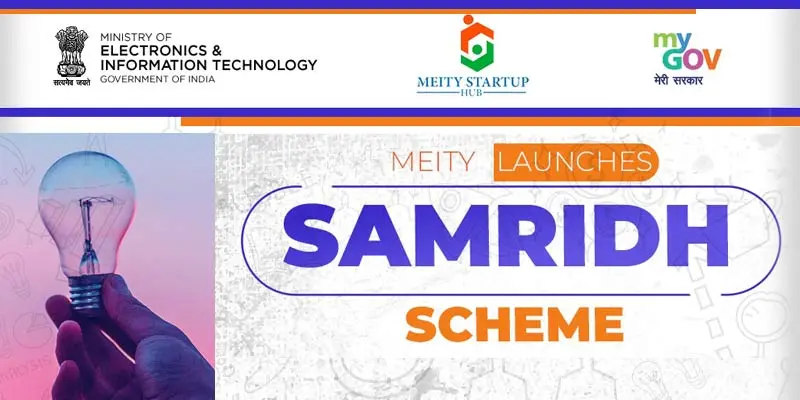
The SAMRIDH program focuses on accelerating 300 start-ups by connecting them with customers, investors, and international expansion opportunities. Additionally, selected accelerators will provide up to Rs 40 lakh in investment to startups based on their current valuation and growth stage. It will also make an equal matching investment by the accelerator or investor possible.
The Samridhi program aims to accelerate the growth of Indian startups, which have seen the emergence of 63 unicorns (startups valued at more than $1 billion), making India the third largest unicorn hub in the world with a total valuation of $168 billion. Many startups face a significant challenge in translating ideas into tangible products or acquiring the necessary skill sets to transform concepts into viable enterprises, and as a result, the Samridh Scheme was launched to aid the potential for substantial value creation.
ELIGIBILITY CRITERIA:
- Must have been involved in the incubation business for more than three years, having helped over fifty start-ups, at least ten of which have secured non-public funding OR having targeted accelerator programs and at least three cohorts of experience running activities that SAMRIDH lists as desirable.
- Carry out business in India.
- Possess the infrastructure and space required to carry out start-up activities.
- Must exhibit the ability to assist startups in entering both domestic and foreign markets.
The Qualcomm Semiconductor Mentorship Program (QSMP)
In this resource, we are discussing “Government Support for Indian Startup Companies”. The second such program we have included: The Qualcomm Semiconductor Mentorship Program (QSMP) is a one-of-a-kind initiative for Indian semiconductor startups. The goal is to assist semiconductor startups in their transition from design to commercialization. As part of the program, startups receive 1:1 mentorship from Qualcomm senior leadership, masterclasses on semiconductor design topics, pitch clinics, IPR workshops, go-to-market training, and so on. They gain exposure to system integrators and potential customers, as well as interactions with various investors and venture capitalists.

This program was released as part of the Semicon India conference and the larger government initiative to support a domestic ecosystem for DLI initiatives in semiconductor design and manufacturing.
ELIGIBILITY CRITERIA:
- Individual startup companies with hardware and embedded design experience. Only registered companies from India will be considered for further evaluation based on the quality of work submitted.
- Students are not eligible for this challenge.
- Only one submission per company will be accepted. Multiple proposals from the same company may result in disqualification.
- Participating companies should ideally have a minimum of one year of experience in embedded design and solutions. Working on the design and fabrication of semiconductors and semiconductor devices (front-end and/or back-end assembly, test, and packaging).
Promoting Innovations in Individuals, Startups and MSMEs (PRISM)
The Nodal Ministry/Department overseeing the PRISM scheme is the Ministry of Science & Technology, specifically the Department of Scientific and Industrial Research, with a primary focus on the Science and Technology sector. The scheme is designed to support individual innovators by offering grants, technical guidance, and mentoring, to incubate their ideas and foster the creation of new enterprises in distinct phases. Additionally, the scheme extends grant-in-aid support to technology solution providers working on solutions to benefit MSME clusters.
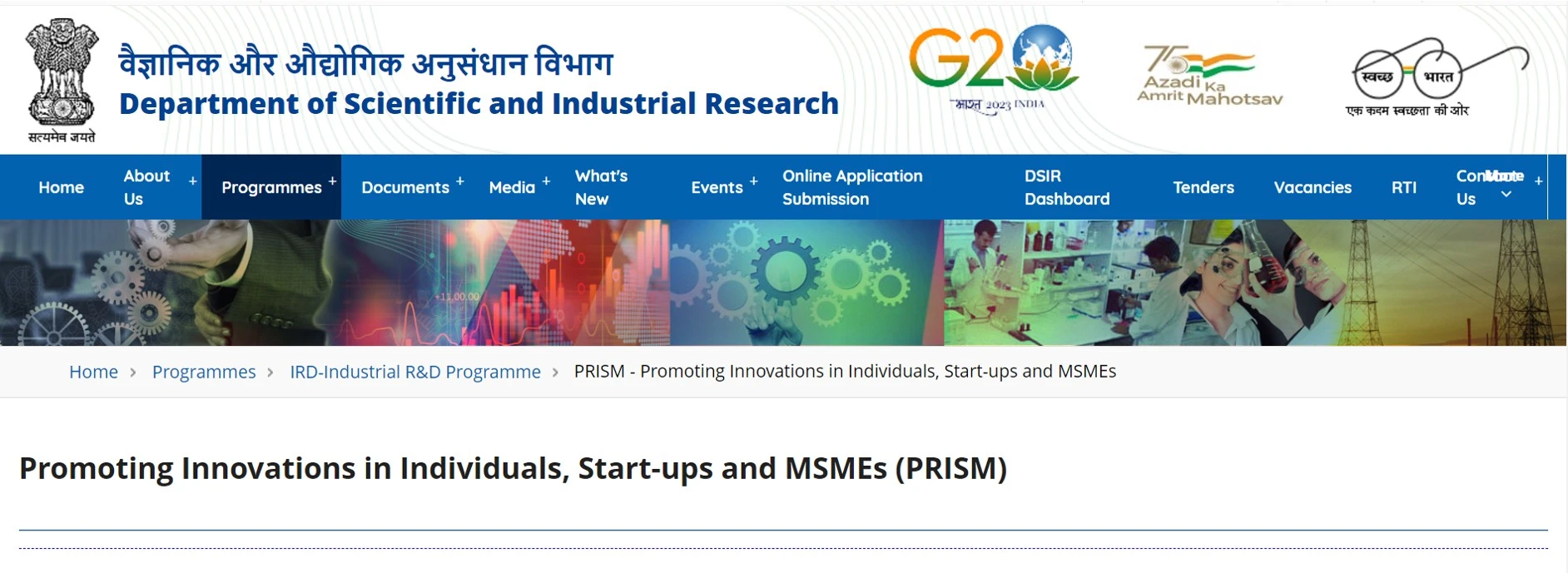
PRISM operates in two phases, each with its set of eligibility criteria and benefits.
The PRISM scheme offers various benefits across its different phases:
In PRISM Phase-I, Category-I, innovators working on proof of concept, prototypes, or models with a project cost up to INR 5 Lakhs can receive financial support. The assistance provided is either a maximum of INR 2 Lakhs or 90% of the total project cost, whichever is less.
For PRISM Phase-I, Category-II, individuals involved in the fabrication of working models, process know-how, testing, trials, patenting, technology transfer, etc., and whose projects cost between INR 5 Lakhs to INR 35 Lakhs, can avail themselves of support. The assistance given is a maximum of INR 20 Lakhs or 90% of the total project cost, whichever is less.
For PRISM-Phase-II, those engaged in enterprise incubation with projects costing between INR 35 Lakhs and INR 100 Lakhs can receive financial assistance. The support is capped at up to INR 50 Lakhs, limited to 50% of the total project cost. Similarly, for PRISM-R&D Proposals, individuals can receive up to INR 50 Lakhs, also limited to 50% of the total project cost.
ELIGIBILITY CRITERIA:
- For PRISM I: Any Indian citizen, including student innovators, is eligible to apply.
- For PRISM II: PRISM innovators or those who have successfully demonstrated proof of concept with the support of a government institution/agency, PRISM-R&D proposals, and public-funded R&D institutes/autonomous institutions/laboratories/academic institutes, etc., are eligible.
Startup India Initiative
Startup India is a flagship initiative of the Government of India that aims to catalyze startup culture and create a strong and inclusive ecosystem for innovation and entrepreneurship in India. Launched on January 16, 2016, the Startup India Initiative has implemented numerous programs aimed at bolstering entrepreneurs, cultivating a resilient startup ecosystem, and shifting India’s focus towards becoming a nation of job creators instead of job seekers. These initiatives are overseen by the Startup India Team, which reports to the Department of Industrial Policy and Promotion (DPIIT).

Key Support Pillars for Startups under the Startup India Initiative are:
- Simplification and Guidance: This involves making compliance processes easier, facilitating a smoother exit for failed startups, providing legal support, expediting patent applications, and creating a website to reduce information disparities.
- Funding & Incentives: Eligible startups can benefit from exemptions on Income Tax and Capital Gains Tax. The initiative also includes a fund of funds to inject more capital into the startup ecosystem and a credit guarantee scheme.
- Incubation & Industry-Academia Partnership: Numerous incubators, innovation labs, events, competitions, and grants are being established to encourage collaborations between industries and academia.
Startup India Seed Fund Scheme
Typically, funding from angel investors and venture capital firms becomes available to startups only after they have demonstrated a proof of concept. Similarly, traditional banks tend to offer loans primarily to applicants with tangible assets. Providing seed funding to startups with innovative ideas for conducting proof of concept trials is, therefore, a pivotal step.
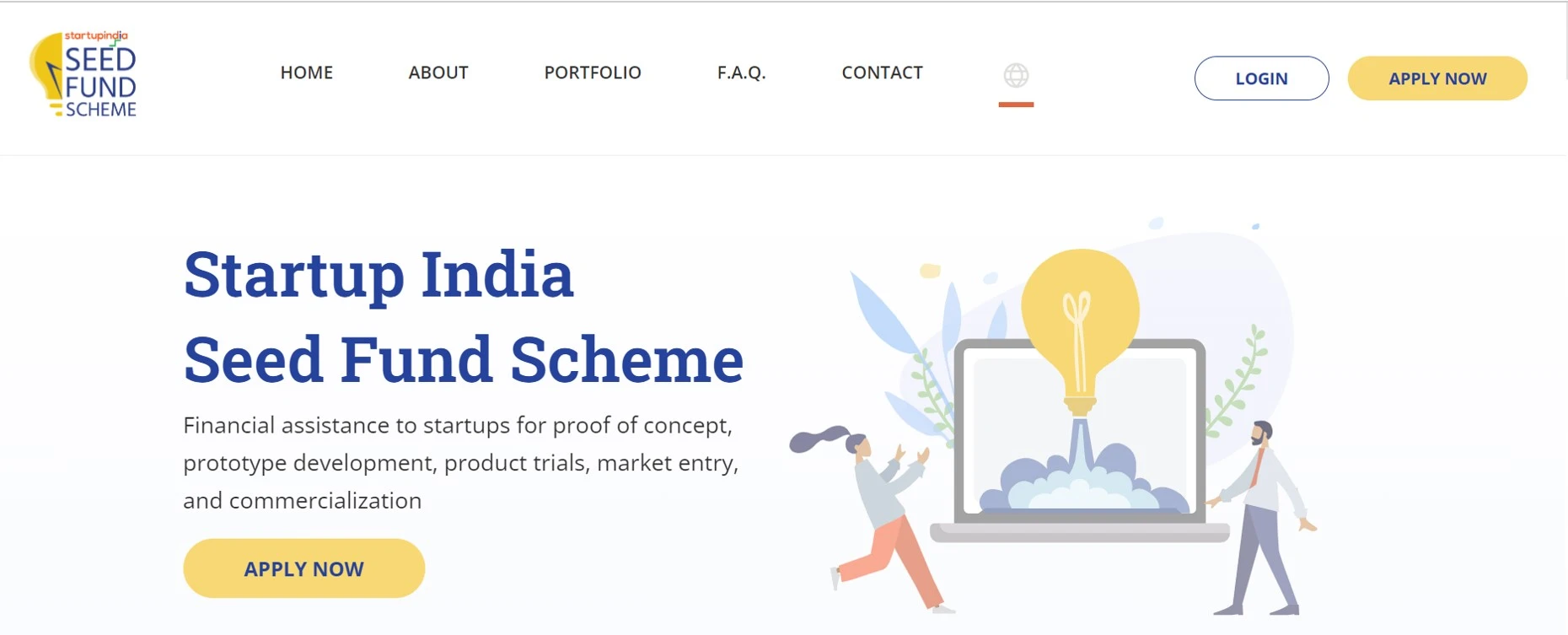
To address this need, the Department for Promotion of Industry and Internal Trade (DPIIT) has launched the Startup India Seed Fund Scheme (SISFS) with a budget of INR 945 Crore. This initiative is designed to provide financial assistance to startups for various activities, including proof of concept, prototype development, product trials, market-entry, and commercialization. Over the next four years, the scheme aims to support around 3,600 entrepreneurs through 300 incubators.
The Honorable Prime Minister of India announced this scheme during his Grand Plenary address at the Prarambh: Startup India International Summit on January 16, 2021. Following approval from the Expenditure Finance Committee (EFC) and the Honorable Finance Minister, the scheme was officially notified on January 21, 2021. The Seed Fund will be disbursed to eligible startups through designated incubators across India.
Support for International Patent in Electronics & Information Technology (SIP-EIT)
The Ministry of Electronics and Information Technology has initiated a program, “Support for International Patent Protection in E&IT,” aimed at providing financial assistance to MSMEs and Technology Startup units for filing international patents. This initiative is intended to promote innovation, acknowledge the significance of global intellectual property, and seize growth opportunities in the ICTE sector. Additionally, as part of the scheme, a second component has been proposed to raise awareness about intellectual property rights (IPR) and disseminate information among stakeholders.
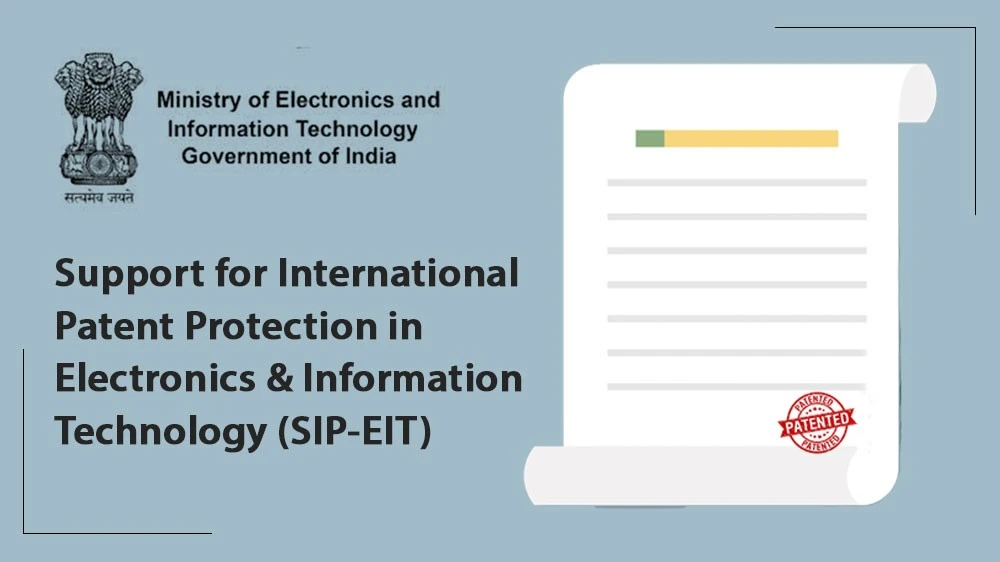
The SIP EIT II program encompasses two schemes:
- Support for International Patent Protection in E&IT: This scheme encourages the filing of international patents, specifically in the Electronics & IT domain. It offers support for international patent protection to Small and Medium Enterprises (SMEs) and Technology Start-Up Companies.
- Scheme to Support IPR Awareness Seminars/Workshops in E&IT Sector: This component, currently under review, aims to provide financial support to educational institutes, Meity societies, etc., for organizing seminars and workshops focused on enhancing awareness about intellectual property rights within the Electronics & IT sector.
Gen-Next Support for Innovative Startups (GENESIS)
MeitY has proposed an umbrella scheme GENESIS (Gen-Next Support for Innovative Startups) with a budget of 490 crores for 5 years to discover, support, grow, and accelerate successful startups in smaller cities and towns, with an emphasis on collaborative engagement among startups, government, and corporates for promoting digitization based on the principles of inclusivity, accessibility, and affordability, leading to growth in employment and economic outputs.
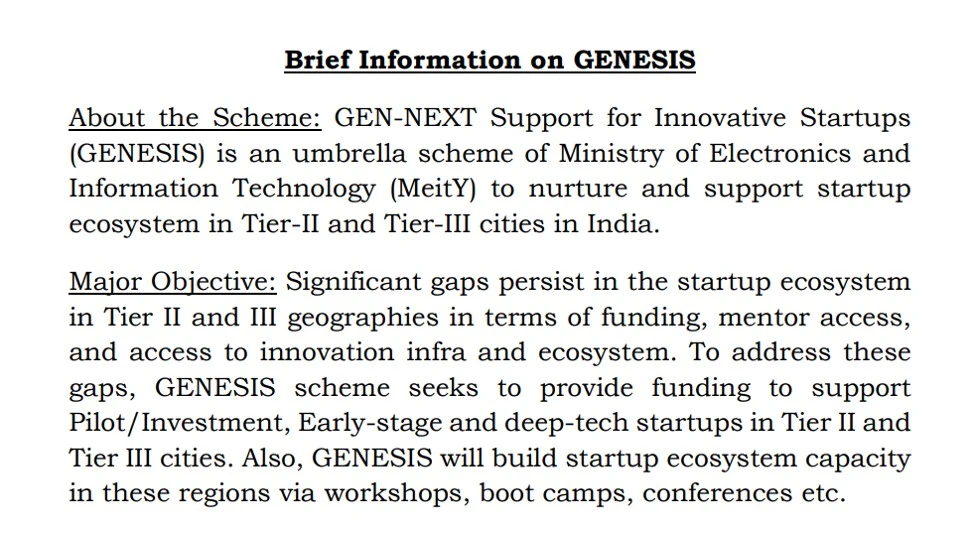
GENESIS intends to expand and sustain the tech ecosystem, particularly to discover, support, grow, and create successful startups. Over the next five years, the program aims to impact and consolidate 10,000+ tech start-ups paving the way for an inclusive startup ecosystem that mirrors the aspirations of our ambitious entrepreneurs and contributes to the comprehensive techno-socio-economic development of the country.
The scheme was launched by Hon. Prime Minister of India Shri Narendra Modi at Gandhi agar, Gujarat, during the Digital India Week in July 2022, in the august presence of Hon. MEIT Shri Ashwini Vaishnav, CM of Gujarat Shri Bhupendrabhai Patel, and MoS MeitY Shri Rajeev Chandrasekhar.
Pradhan Mantri Mudra Yojana (PMMY)
The Prime Minister’s Mudra Yojana (PMMY) stands as a flagship initiative of the Government of India. This program facilitates micro-credit/loans of up to Rs. 10 lakhs for income-generating micro-enterprises operating in the non-farm sector, encompassing manufacturing, trading, or service activities. It also extends to sectors allied to agriculture, such as poultry, dairy, beekeeping, etc. The scheme entails financial support provided by Member Lending Institutions to micro and small entities engaged in non-corporate, non-farm sector income-generating activities.
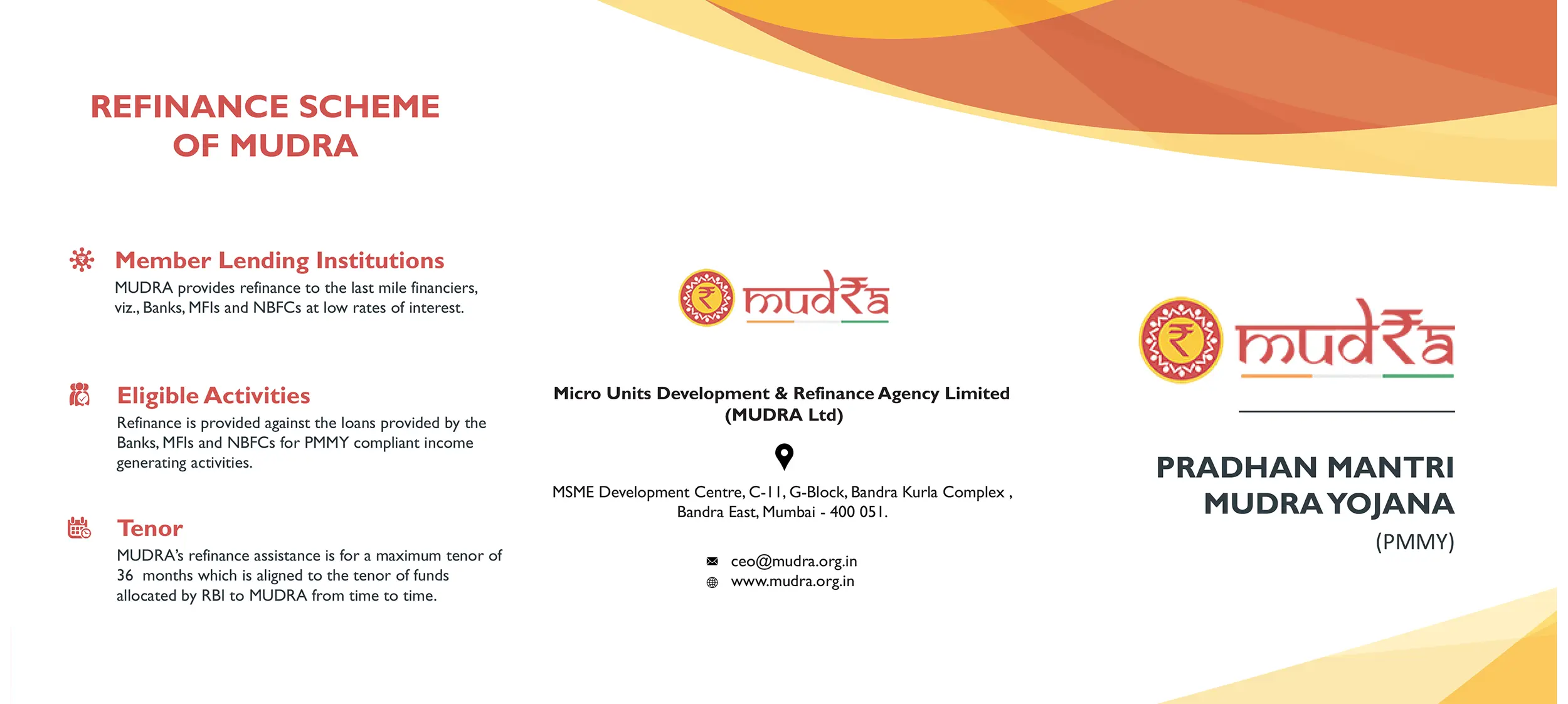
These micro and small entities constitute numerous proprietorship/partnership firms functioning as small manufacturing units, service sector units, shopkeepers, fruit/vegetable vendors, truck operators, food service units, repair shops, machine operators, small industries, artisans, food processors, and others.
Pradhan Mantri Mudra Yojana loans are accessible through eligible Member Lending Institutions (MLIs), including Public Sector Banks, Private Sector Banks, State-operated cooperative banks, rural banks in the regional sector, Micro Finance Institutions (MFIs), Non-Banking Finance Companies (NBFCs), Small Finance Banks (SFBs), and other financial intermediaries approved by Mudra Ltd. as member financial institutions.
ELIGIBILITY CRITERIA:
Any Individuals, Proprietary concern, Partnership Firm, Private Ltd, Company, Public Company or Any other legal forms.
The applicant must not be a defaulter with any bank or financial institution and must have a good credit history. Individual borrowers may be required to have the required skills/experience/knowledge to carry out the proposed activity. The nature of the proposed activity and its requirements determine the need for educational qualification, if any.
Multiplier Grants Scheme (MGS)
The Department of Electronics and Information Technology (DeitY) is actively implementing the Multiplier Grants Scheme (MGS). MGS is designed to promote collaborative Research and Development (R&D) endeavors between industry entities and academic/R&D institutions for the creation of products and packages. Under this initiative, if the industry supports R&D for product development at the institutional level, the government will offer financial assistance, up to twice the amount contributed by the industry. Proposals seeking financial support under the scheme must be jointly submitted by both the industry and the institutions.
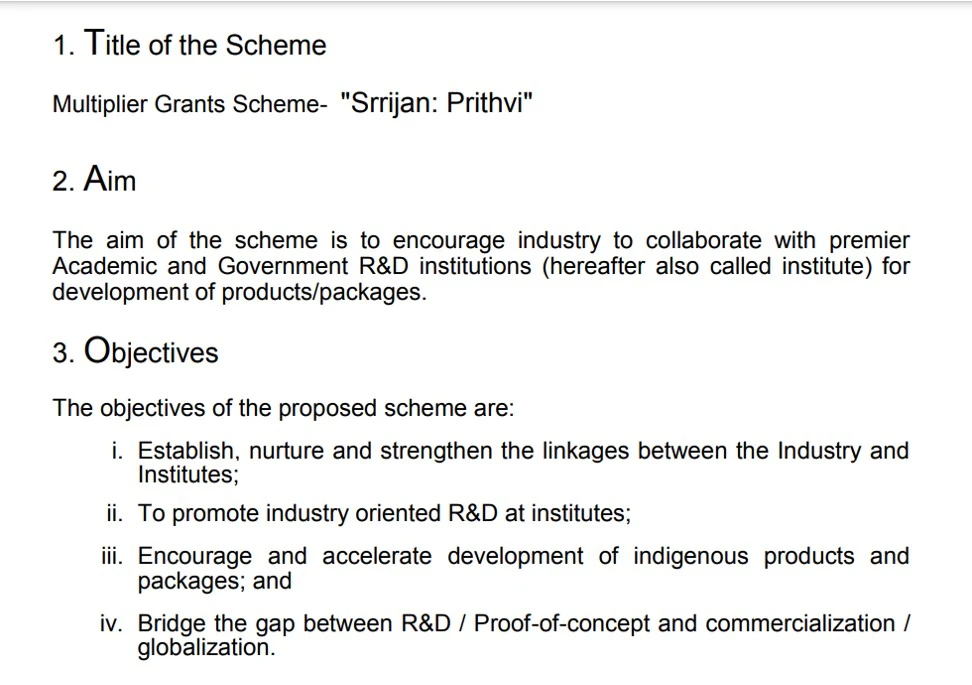
Regarding funding grants, the government grants for individual industry projects are capped at a maximum of Rs. 2.0 Crores per project, with a preferred project duration of less than 2 years. For industry consortiums, these figures are increased to Rs. 4.0 Crores per project, with a recommended project duration of 3 years. It is important to note that the contribution from the industry and the grant-in-aid from DeitY will be directed solely to academic and R&D institutions.
ELIGIBILITY CRITERIA: Startup, Incubator/Academia/Accelerator having projects in electronics & information technology
eBiz initiative
The eBiz initiative, currently being tested by the Department of Industrial Policy and Promotion, is designed to offer thorough Government-to-Business (G2B) services to businesses. The goal is to provide transparency, speed, and certainty in interactions between business entities and government agencies. The initiative focuses on minimizing contact points, standardizing “requirement information,” establishing single-window services, and reducing the compliance burden. These efforts are aimed at benefiting various stakeholders, including entrepreneurs, industries and businesses, industry associations, regulatory agencies, industrial promotional agencies, banks, and financial institutions, as well as taxation authorities.
The eBiz portal website is part of Modi’s ‘Digital India’ initiative, which aims to build digital infrastructure and improve government service delivery. The portal has launched 29+ services across five Indian states, including Andhra Pradesh, Delhi, Haryana, Maharashtra, and Tamil Nadu. However, after several rounds of discussions about shutting down the eBiz initiative since July 2018, it was finally shut down due to low service integration. According to the 2020 updates, the government intends to resurrect eBiz-like portals.
One of eBiz’s standout features is its payment gateway solution. Government fees are transferred on a ‘T+1’ basis with the integration of PSU banks. DIPP has established an electronic PAO system (ePAO) for eBiz transactions, which will book and reconcile all Central Government fees received through the eBiz portal. The Comptroller General of Accounts has approved the establishment of an electronic system for collecting, allocating, and remitting fees collected through the eBiz portal. For the first time in the country, fee collection via credit and debit cards for various services has been permitted, making it very convenient for businesses to deposit fees.
GeM had over 63,000 government buyer organizations, over 6 crore sellers and service providers, and a diverse range of products and services as of March 2023. Currently, transactions can be completed through this portal by government departments, ministries, public sector units, state governments, and central armed police forces.
ELIGIBILITY CRITERIA: SME eBiz Loan benefits are available to sellers who have registered on an e-commerce portal to sell goods online and who have at least a six-month history with any of the major e-commerce players.
ATAL Innovation Mission
The Atal Innovation Mission (AIM), NITI Aayog, was established in 2016 as the Government of India’s flagship initiative to promote a culture of innovation and entrepreneurship in the country. AIM has taken a comprehensive approach to this end, ensuring the development of a problem-solving, innovative mindset in schools and the establishment of an entrepreneurship ecosystem in universities, research institutions, the private sector, and the MSME sector.
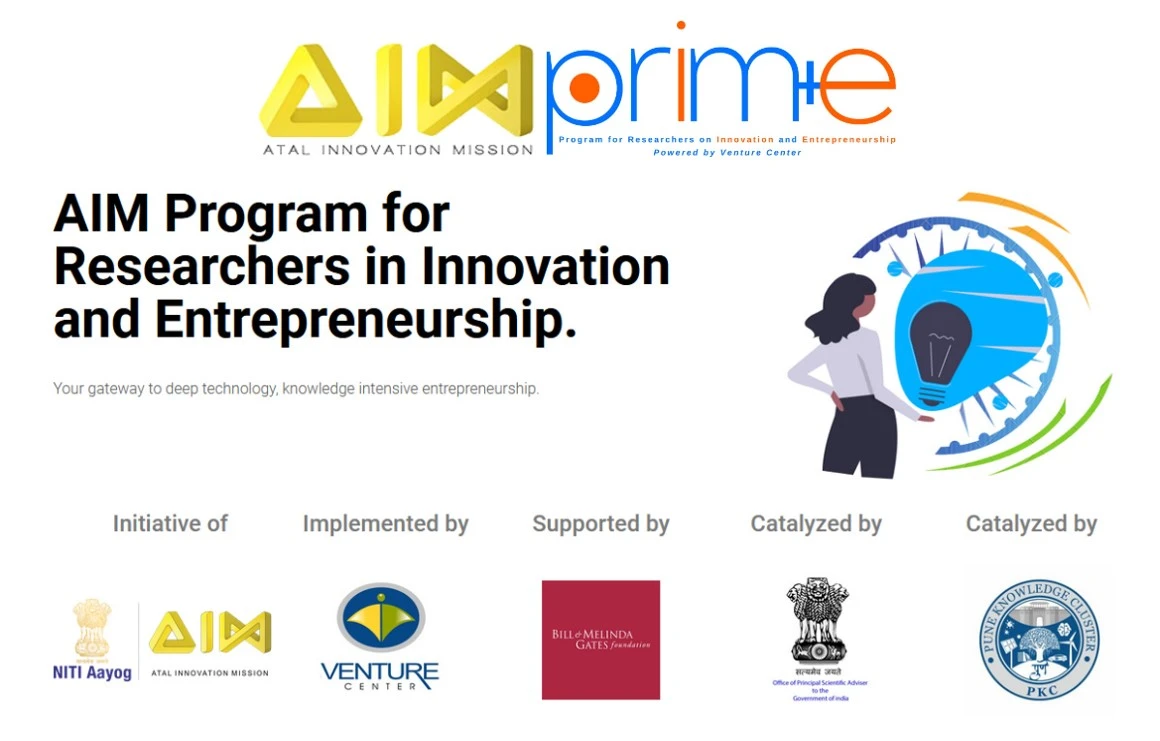
The ANIC program’s primary objective is to endorse innovations crucial to India’s progress and advancement in key sectors such as Education, Health, Water and Sanitation, Agriculture, Food Processing, Housing, Energy, Mobility, and Space Applications. The Atal New India Challenge aims to tackle the challenges of commercialization by aiding innovators in mitigating risks related to resource acquisition for testing, piloting, and market establishment. ANIC invites prototype-stage innovations from startups and MSMEs and, following a competitive selection process, provides support through the commercialization phase over a 12-to-18-month duration, including funding of up to INR 1 crore and additional assistance from AIM’s innovation ecosystem.
ELIGIBILITY CRITERIA:
- Academic Applicants: a) Universities and colleges affiliated with UGC and AICTE.
b) Technical Diploma Colleges and ITIs
- Non-Academic Applicants: Organizations promoting science and technology.
ASPIRE
The Indian government launched ASPIRE Scheme or A Scheme for Promotion of Innovation, Rural Industries, and Entrepreneurship to establish a network of technology centers and incubation centers to accelerate entrepreneurship and to promote startups for innovation and entrepreneurship in rural and agriculture-based industries. It also entails the establishment of Technology Business Incubators (TBIs).
The government has consistently worked towards enhancing the social and economic conditions in rural India, and a prominent initiative in this realm is ASPIRE. The Scheme for Promoting Innovation, Rural Industries, and Entrepreneurship (ASPIRE) is a Government of India project led by the Ministry of Micro, Small, and Medium Enterprises (MSME).

Established in 2015, this initiative aims to empower entrepreneurs by providing essential information to kickstart their businesses and create job opportunities. Given that rural areas house 56 percent of the Indian population, the government utilizes ASPIRE to promote entrepreneurship and innovation in these regions. The scheme is designed to boost employment, alleviate poverty, and foster innovation specifically in rural India, with a primary focus on developing the agro-business industry. The Ministry of Micro, Small, and Medium Enterprises is actively working to stimulate economic growth at the grassroots level through the ASPIRE scheme.
ELIGIBILITY CRITERIA:
All MSMEs with an Entrepreneurs Memorandum (EM) registration.
Conclusion
In conclusion, startups play a crucial role in addressing real-world challenges and fostering innovation. In this article, we have discussed several programs and initiatives where Government Support for Indian Startup Companies. The Indian government recognizes the potential of startups to drive economic growth, create jobs, and promote entrepreneurial culture. Through various initiatives and financial support, governments aim to encourage and empower startups, especially in sectors like manufacturing, technology, healthcare, and agriculture. In India, both government and private investors are actively supporting the growth of startups and MSMEs, reflecting a collaborative effort to propel these ventures onto the global stage. This joint commitment between the public and private sectors bodes well for the continued development and recognition of Indian startups and entrepreneurs on the global landscape.
Our Services
Utility Patent Drawings | Design Patent Drawings | Patentability Searches | Invalidity Searches | Freedom to Operate FTO Searches | Patent Landscape Analysis Search Reports
References:
- https://www.myscheme.gov.in/schemes/pmmy
- https://www.indiascienceandtechnology.gov.in/funding-opportunities/startups/aspire-scheme-promotion-innovation-entrepreneurship-and-agro-industry
- https://www.msmex.in/learn/aspire-scheme/
- https://www.indiascienceandtechnology.gov.in/funding-opportunities/startups/multiplier-grants-scheme-mgs
- https://www.meity.gov.in/content/e-biz
- https://www.pib.gov.in/newsite/PrintRelease.aspx?relid=115592
- https://indianstartupnews.com/article/top-government-schemes-for-indian-startups-and-entrepreneurs/
- https://www.startupindia.gov.in/content/sih/en/ams-application/incubator-program.html?applicationId=629ef8fbe4b028cbac19cd82
- https://www.meity.gov.in/content/support-international-patent-protection-electronics-information-technology
- https://www.startupindia.gov.in/content/sih/en/government-schemes.html
